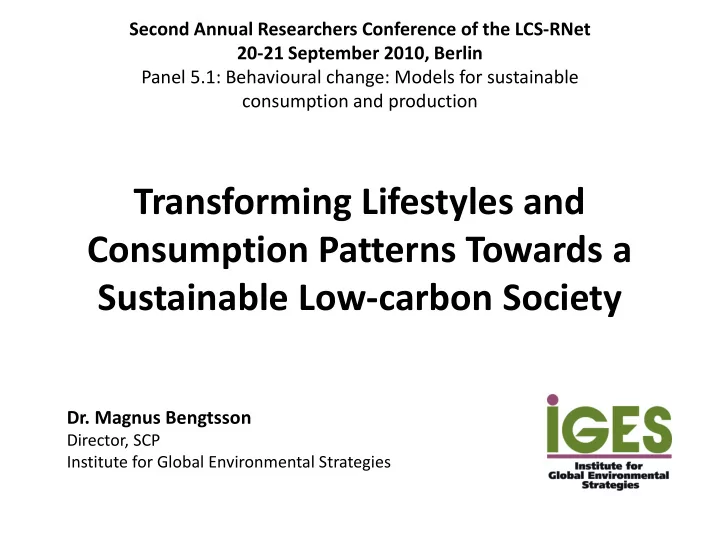

Second Annual Researchers Conference of the LCS-RNet 20-21 September 2010, Berlin Panel 5.1: Behavioural change: Models for sustainable consumption and production Transforming Lifestyles and Consumption Patterns Towards a Sustainable Low-carbon Society Dr. Magnus Bengtsson Director, SCP Institute for Global Environmental Strategies
Starting Points • The creation of a SLCS will require a more radical and fundamental transformation than most of us realize • Technological change and efficiency improvements are important but insufficient • Changes in values, aspirations and lifestyles will be also be necessary • However, the need for such changes is often not recognized
Sustainable Consumption – Two Separate but Connected Aspects Environmental Sustainability Natural resources Consumption of resources which stays within the carrying capacity of the Earth Production Consumption of products and services which meets at least basic needs of all people Human wellbeing Economic and Social Sustainability
The Standard Approach to Sustainable Consumption Many approaches to Sustainable Consumption focus on the buying decisions made by individual consumers . Such approaches are based on the idea that consumers are “ voting with their wallets ”, and that enlightened and responsible consumers can drive the market towards sustainability. Policy proposals based on this idea typically emphasize: • Awareness raising and consumer education • Information to consumers on products’ environmental performance, e.g. eco-labelling
Individual Consumers are Weak The role of individual consumers is overstated and consumers are often unfairly blamed for consuming unsustainably • Consumers’ choices are limited to what producers want to offer • Consumer prices do not reflect the life-cycle environmental impacts of products and services • Consumers feel strong expectations from society to consume – Consumption as self-expression – Consumption as group identity signal – Consumption as social status marker • Social pressure to consume more is amplified by advertising and by political initiatives to expand the economy • Consumer choice is often habitual and unreflected • “I will if you will”
Systems Transformation is Needed Technology Consumption patterns are supported and constrained by complex Knowledge and know- Habits socio-technical systems how Radical transformation Consumption of consumption patterns pattern require that whole systems be modified Laws, Consumers have regulations Infrastructure and standards limited possibility to bring about systems Social norms changes and values
A lifestyles approach to SC Lifestyle Consumption Important to look at lifestyles and not to focus narrowly on consumption Important to understand the role of consumption in different lifestyles
Lifestyles and Consumption Patterns are Influenced by All Major Policy Areas Industry Environmental policies policies Agriculture Social policies policies Lifestyles and and Fiscal policies XX policies Consumption Patterns Add-on environmental policies are insufficient for enabling SC The necessary transition to SC will not happen unless major policies are redesigned
SC Requires Enabling Policy Measures SC requires more than simply encouraging consumers to make responsible buying decisions It requires enabling measures addressing the structures that drive and shape consumption Policy measures need to be broad-based and involve the policies of several different line ministries Such actions require collective decisions based on democratic deliberation Concerned individuals need to promote SC also outside of their role as consumers , working for changes that can enable SC – Influencing political decisions – Taking action at community level
Recommend
More recommend